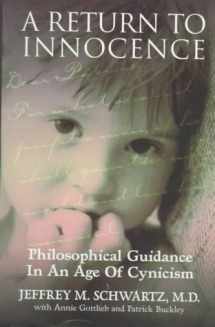
A Return to Innocence: Philosophical Guidance in an Age of Cynicism
Book details
Summary
Description
On the verge of a new millennium, in an age of unprecedented affluence, personal freedom and scientific power, millions of us--young and not so young--find ourselves emotionally and morally adrift. Even as our mastery of the material world reaches new heights almost daily, mastery of the inner world--of our own actions, emotions, and deepest hopes--often tragically eludes our grasp. As families come apart, adults become bitter and emotionally detached. Children fall prey to a "culture" of sex and drugs, cynical materialism, and self-destructive nihilism. It increasingly seems that, in the piercing words of Jesus, we have "gained the whole world, and lost our own souls."
In A Return to Innocence, psychiatrist and neuroscientist Jeffrey M. Schwartz--a Jewish student of both Buddhist meditation and Christian philosophy--combines 3,000 years of wisdom with cutting edge brain and behavioral research to guide us in recovering our souls, our safety, our integrity and our capacity to love. After a 35-year experiment in unbridled self-gratification that has left a burden of tremendous suffering in its wake, at last we are ready to understand that innocence--in its original meaning of "not harming"--is actually the highest and most difficult of human achievements. The lost art of self-command that empowers us not to harm ourselves or one another is the core teaching of humanity's greatest spiritual masters, including Moses, Jesus, and Buddha. If we value our children, our culture, even our very freedom, we must return to true innocence as our source of inner lightness, clarity and spiritual power. A practical path to this wellspring of inner purity was mapped out 2,500 years ago by Gotama Buddha--in Dr. Schwartz's view the greatest psychologist who ever lived--whose still-fresh insights into human nature can serve as a bridge joining the wisdom of the Bible to the discoveries of 21st century science.
A deeply felt, thought-provoking exchange of letters between "spiritual coach" Dr. Schwartz and sixteen-year-old Patrick Buckley, the son of a single mother, frames this fascinating, powerful code for living that shows how the best in each of us can thrive. Spiritual and philosophical ideas become hands-on tools for dealing with real-life dilemmas as Dr. Schwartz addresses Patrick's urgent questions about morality, responsibility, and freedom of choice.
This book offers an empowering combination of hope, inspiration, accurate information about the biology of human nature, as well as desperately-needed guidance for keeping that nature on a life-affirming path. To everyone--young and old--A Return to Innocence offers dynamic, concrete solutions for the pain in our hearts, the fear in our streets, and the cynicism that has corroded our ideals. It speaks directly to our longing for a decent, meaningful, and fulfilling life.
The traditional values that made civilization possible were thought to be outrageously radical and daring when they were first introduced by revolutionaries like Moses, Buddha, Jesus and Mohammed. . . . Yet those codes of behavior became "traditional"--that is, they got handed down from generation to generation--for one simple reason: they work. And they work because they're based on a highly sophisticated and deeply wise understanding of human nature.
We often hear the phrase "Knowledge is power"--but nowhere is it truer than when it comes to knowledge of ourselves.
Are we humans primarily driven, or "drivers"? Are we blameless puppets of our genes, our hormones, our childhoods, or do we have the power, and so the responsibility, to choose what we will do?
In our day and age, everyone wants to be, or at least appear to be, streetwise, experienced, cool, and cynical. What people don't realize is that the source of the word "innocent" is a place of great power. It comes from the Latin words for "not" and "to harm." True innocence is the highest of human accomplishments. Not doing harm requires the utmost in awareness, effort, and courage.
The state of the world begins right here--in the state of your mind.


We would LOVE it if you could help us and other readers by reviewing the book
Book review



